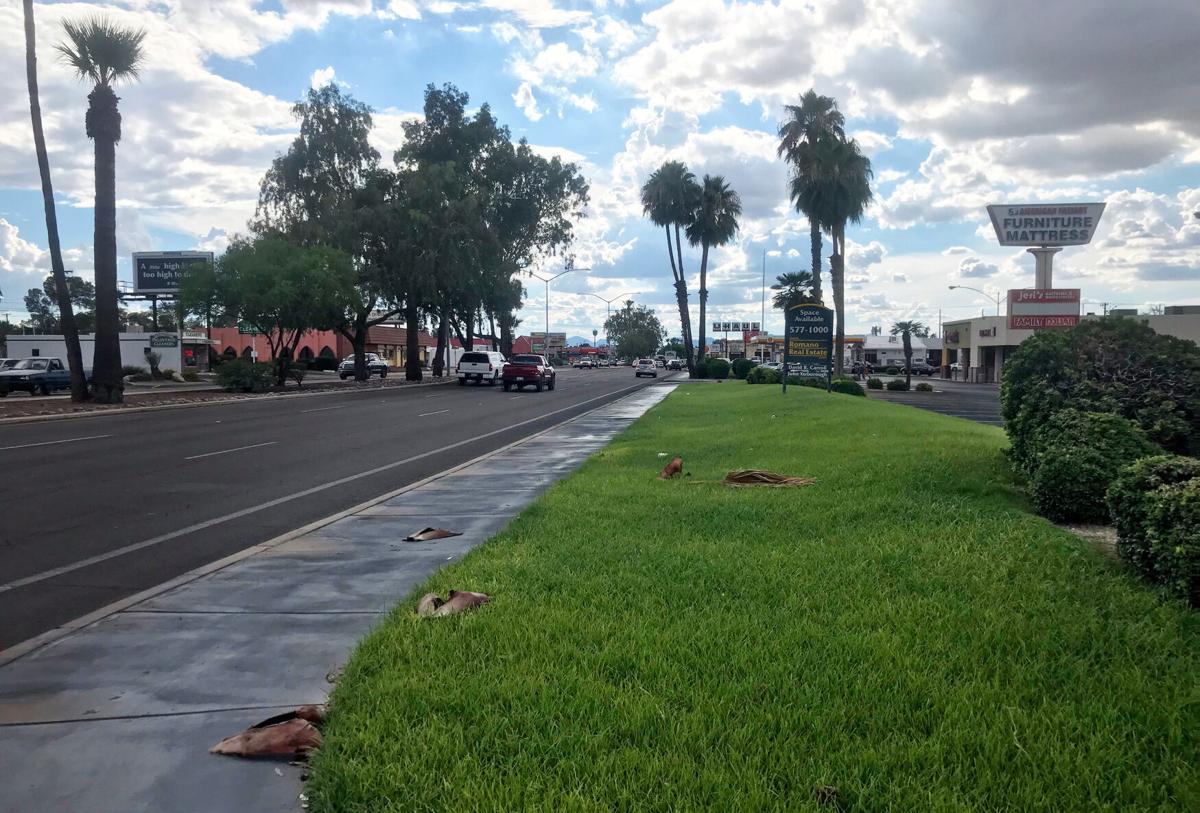With little debate, let alone opposition, the Tucson City Council unanimously approved a ban on non-functional grass planting in all new developments except single-family homes.
The council also unanimously approved a new requirement Tuesday night for developers to install federally certified water-saving fixtures in all new development, including single-family homes.
Both actions are part of a broader, ongoing effort by the City Councll and city officials in general to strengthen Tucson’s water conservation efforts in the face of ongoing drought and a water crisis on the Colorado River. Several other conservation measures have been under review by Tucson Water staff but haven’t yet come to the council for final consideration.
The turf ban has sparked a significant amount of attention since it was first suggested last year by Ward 3 Councilman Kevin Dahl. But it has generated little or no opposition, even among developers and their various interest groups, city staff memos to the council indicate. It previously was unanimously recommended by the City Planning Commission.
In general, the ordinance prohibits the planting of grass in non-single family home developments when it’s not clearly functional, including for recreation. It doesn’t affect any existing or future use of artificial turf. it affects all forms of commercial and industrial development, as well as “common areas” in apartment projects.
More specifically, the ordinance defines non-functional grass as follows:
Grass areas with any single dimension of eight feet or less.
Grass areas exceeding a 25% slope, a measurement based on the grade of the landscape in relation to the street.
Grass areas that are not accessible by paved pathways and/or are restricted by physical barriers that prohibit accessibility.
Grass areas installed closer than ten feet to a street and/or in front entryways to residential neighborhoods or subdivisions unless associated with active recreational activities.
Grass areas that are not utilized for active recreational purposes.
Dahl told the Star on Wednesday that a ban on non-functional grass in new single-family homes will be discussed as the council moves into its second phase of tackling the turf issue.
“It’s harder to decide in a residential setting whether turf is non functional compared to a commercial setting. In apartments it’s clear where there’s grass for kids to play or walk their dogs.,” he said. “In a huge incline, when you can’t even walk there, it’s ornamental. Developers, when they come in to get landscaping plans approved, they will describe what will be functional and what will be allowed;
“We’re going to look at residential turf. Maybe incentives are the way to go. City staff has more time to look at those possibilities,” he said.
The Tucson Water staff will also be looking into possible future requirements or incentives to remove existing non-functional grass.
As for the plumbing fixture rules, they will require all new developments to meet the following Environmental Protection Agency-required water use limits from “water-sense” fixtures:
Toilets — 1.28 gallons per flush.
Faucets — 1.5 gallons per minute water flows, at 60 pounds per square inch pressure.
Urinals — .5 gallons per flush.
Shower heads — 2 gallons per minute.
Any water and energy savings triggered by the use of water-saving fixtures will also result in cost savings for customers, Tucson City Manager Michael Ortego told the council in a memo on Tuesday.
“The EPA estimates that, just for toilets, the customer will save over $140 annually, and more than $2,900 over the lifetime of the toilet,” Ortega wrote. “If paired with the multitude of other fixtures, the short and long-term cost savings will be significant.”
The city government will also benefit from new development’s higher water efficiency, Ortega wrote. As water use efficiency increases, infrastructure requirements to serve new growth could be reduced, although “this one measure alone would not achieve this,” Ortega wrote.
Both proposals underwent extensive and largely uncritical reviews by various interest groups and city advisory panels.
Eric Wiedewult, a deputy director for Pima County’s Regional Wastewater Reclamation Department, emailed a Tucson Water staffer on April 18 that he looks forward to seeing these ordinances implemented
“While the reduction in water demand will have some impact on wastewater conveyance and treatment, the community cannot wait any longer to start taking strong steps towards net zero urban water. We will address the challenges with wastewater as the systems evolve,” Wiedewult wrote the utility’s Candice Rupprecht.
“Keeping (wastewater) in the loop at both the start of new initiatives and involved in the ongoing data analysis and performance measurements will keep us aligned with changing water demand and the potential associated impacts to wastewater,” said Wiedewult.
Wiedewult was referring to the periodic concern expressed by some officials that reduced water flows into the sewers due to conservation could lead to a higher proportion of solids in the sewers, potentially clogging operations.
At Tuesday’s City Council meeting, the only public comment on either ordinance came from former state representative Tom Prezelski, who spoke in favor of the non-functional grass ban. He represented Rural Action Arizona, which works on behalf of rural communities, but said he was at the council meeting because “we have a water crisis in Arizona.
“This issue is far bigger than Tucson. There are areas of this state where there is simply not enough water for future development,” said Prezelski, referring to Arizona Department of Water Resource reports making such findings for Pinal County and parts of the Phoenix area.
In rural areas, water supplies are being threatened by “large, industrial agricultural operations.” he said.
“It’s long past time we take this issue seriously. This body deserves praise for doing so. Anything that gets done on this issue is important for this state as a whole — just basic, responsible behavior in taking out and not squandering our water supplies,” Prezelski said.
Get your morning recap of today's local news and read the full stories here: http://tucne.ws/morning





